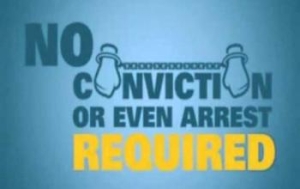Policing for Profit (Part 2)
 Why would legislators promote civil forfeiture in South Carolina given the numerous accounts of abuse in other states? It seems that legislators are banking on the fact that the voting public is not aware of how civil forfeiture can be misapplied. It’s easy to sell this initiative as making neighborhoods safer, being tough on crime, and all the things that make us feel warm and fuzzy. Significantly, lawmakers can tell taxpayers that all these additional services will cost them nothing, no new taxes, remember we’re making criminals pay, not the law abiding citizens. Except for one thing, civil forfeiture does not involve criminals because no one is arrested.
Why would legislators promote civil forfeiture in South Carolina given the numerous accounts of abuse in other states? It seems that legislators are banking on the fact that the voting public is not aware of how civil forfeiture can be misapplied. It’s easy to sell this initiative as making neighborhoods safer, being tough on crime, and all the things that make us feel warm and fuzzy. Significantly, lawmakers can tell taxpayers that all these additional services will cost them nothing, no new taxes, remember we’re making criminals pay, not the law abiding citizens. Except for one thing, civil forfeiture does not involve criminals because no one is arrested.
An in-depth review by the Washington Post
In a Washington Post investigation, civil forfeiture is being misapplied in numerous states that have enacted civil forfeiture laws. You can fight to get your money back but as one officer stated in the video “Good luck proving it, you’ll burn it up in attorneys fees before we give it back to you.” Faced with that realization, many people choose to surrender because they don’t know that they can challenge these types of cases even if they are from another state.
As you can see from the video, there are a number of legitimate reasons why people travel with cash but that does not matter out on the road, you’ll have to fight the case in court. When you give anyone, not just police, a financial reward in exercising their authority to make large amounts of money it’s human nature to aggressively pursue that cause and encourages this behavior. The most clear statement of this came from the police agency in the video where they stated “There is absolutely the potential for misuse and abuse” when referring to civil forfeiture.
Police agencies fight over traffic stop: It’s on video
In this investigation by a news team in Tennessee, competing law enforcement agencies on the same stretch of highway abuse each other trying to conduct a traffic stop on the same vehicle (See at 7:25). This is what happens when you create laws that provide profit-based rewards without the requirement of due process from an arrest.
Police chief uses drug fund money to clear his personal property and got caught
In an investigative report a Tennessee police chief was exposed using drug funds for his personal gain where a government bulldozer was located on his property. It took a news station with the resources of a helicopter that could view the bulldozer on the police chief’s land and then having the power of the press to put the mayor on the spot to answer questions about the incident. Not surprisingly he refused to answer questions on camera.
In a follow-up the police chief in question has been indicted by a grand jury for misconduct in office and then plead guilty. Click here to see the fallout.
Police plan budgets based on civil forfeiture revenue
In Washington D.C. the cash from civil forfeiture generates so much revenue that police departments establish their budgets (See here) on future cash seizures. That’s right, these seizures are so profitable that police departments set up task forces to collect these funds to finance their own budgets. This means officers will be sent out to fill cash quotas to satisfy the budget requirements, not to fight crime and that’s what’s so wrong with this policy, it diverts police from law enforcement, again no arrests are made.
Think this won’t happen in South Carolina
The end result is that police have seized billions of dollars not from terrorist groups, drug traffickers, or violent offenders. You might ask prove it, which is a legitimate question. The department of Justice keeps this data and was reported in the Washington Post:
- 61,998 seizures made without an arrest;
- More than 2.5 Billion in cash seized from those non-arrests;
- Half of the seizures were amounts less than $8,800.
The scary part of this equation is that it only encompasses the federal seizures and not funds seized by state civil forfeiture actions. If police really thought the funds they seized came from terrorists groups, drug dealers, violent criminals, which is what the program was initially designed to thwart, don’t you think that it would be important to make arrest and bring to justice those 61,998 persons they took money from.
In South Carolina alone, there have been at least 832 seizures totaling $43 million dollars being taken.
Civil Asset Forfeiture Attorney, Charleston SC
If you have had your property taken through civil asset forfeiture contact an experienced and trusted criminal defense lawyer Charleston, SC call the Dale Savage Law Firm today for a free case evaluation (843) 530-7813.

